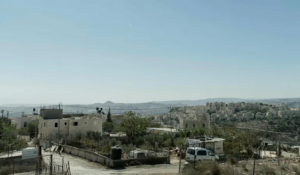139 East Jerusalem residents discover land they live on is registered to the JNF

The East Jerusalem neighborhood of Umm Tuba, October 2024
Nir Hasson reports in Haaretz on 30 October 2024:
139 East Jerusalem residents recently discovered that the lands on which they have been living for decades are registered in the Land Registration and Settlement Authority (known in Israel as “Tabu”) in the name of the Jewish National Fund.
These residents, who live in a 20-dunam (about 5 acres) area in the Umm Tuba neighborhood, discovered this after one of them applied to the Jerusalem municipality in June to obtain a building permit on land he owns. The Jewish National Fund could now potentially seek the residents’ eviction.
According to the residents, they had no idea that any process for registering the land was underway. They say no one contacted them about it or asked them to present documentation proving their ownership of the land.
Since 1967, the Israeli government stopped registering land in East Jerusalem. Unlike everywhere else in the country, real estate sales in this area were not registered in the Tabu, and the state has no registry of land ownership there. As a result, many residents built homes on their land without permits and without formal registration with the Land Authority.
However, unlike in many other parts of East Jerusalem, most of the buildings in Umm Tuba did receive building permits after the municipality checked the status of the land and confirmed that the residents are the legal owners. The residents also say that they have British and Jordanian documents that attest to their ownership of the land, and copies of Arnona (municipal tax) bills paid for decades to the Jerusalem municipality.
After learning that the land they are living on is registered to the JNF, the residents found out that JNF representatives had claimed to David Rotenberg, the Land Registry Officer and Inspector of Lands at the Israeli Justice Ministry, that it purchased the land nearly one hundred years ago from five local residents. However, a resident of the neighborhood explains that the area in question “was not owned by five people and the family that supposedly sold this land did not own any land in this area.”

Residents of Umm Tuba, October 2024
When residents contacted Rotenberg about the situation, he responded that they should have checked the government website where announcements are posted to see if the regularization process for their area had begun. The residents pointed out that these announcements are only published in Hebrew, and that many of them don’t speak the language well enough.
Attorney Yazeed Kawar, who represents the residents, explained that in Umm Tuba, as in many parts of East Jerusalem, there is no notation of blocs and plots. Therefore, he says, even if the residents could find the government announcements, they wouldn’t be able to tell if they related to the lands where their homes are located.
Rotenberg also claimed that representatives from his office put up signs around the neighborhood announcing the regularization process, but residents say they did not see any such signs.
Last week, Kawar and attorney Mohammed Dahla filed a petition with the High Court seeking to cancel the land registry in the JNF’s name. “The Land Registry Officer expects ordinary citizens to comb through every regularization announcement to see if one applies to their small plot—a completely unreasonable demand,” the lawyers wrote.
“This is our land, our ancestors’ land. Where were they 30 years ago when my grandfather was here?” asks Yusef Abu Tir, a resident. “Ben-Gvir and Smotrich only want to drive all Arabs out to Jordan. We won’t leave our land. This is a scheme by the Land Registry Officer. No one approached us, no one informed us.”
Land registration in East Jerusalem began in 2018 under a five-year government initiative aimed at closing socioeconomic gaps between East and West Jerusalem. The government instructed the Justice Ministry’s Land Registry Office to begin registering land in East Jerusalem to streamline construction planning in the area. However, many Palestinian residents were wary, fearing that the project might dispossess them by registering lands in the names of Jews. Indeed, since then, most of the registry office’s activities have focused on land blocs with Jewish ownership or areas slated for Jewish neighborhoods.
The regularization process in Umm Tuba was requested by another Justice Ministry department—the Guardian General—which is facilitating the construction of a new Jewish neighborhood, Nofei Rachel, just meters from the Umm Tuba buildings on land that was Jewish-owned in the last century. This neighborhood is one of four over the Green Line in Jerusalem being advanced through an unusual process involving cooperation between the Guardian General’s office and right-wing activists.
In July, the International Court of Justice in The Hague issued an opinion declaring Israel’s presence in the West Bank illegal and calling for its immediate cessation. The opinion also addressed the East Jerusalem land registration process, stating that it was intended to expand Israeli settlements at the expense of Palestinian territory. “All these measures pressure Palestinians in East Jerusalem to leave the city,” it stated.
The Justice Ministry declined to comment.
This article is reproduced in its entirety
